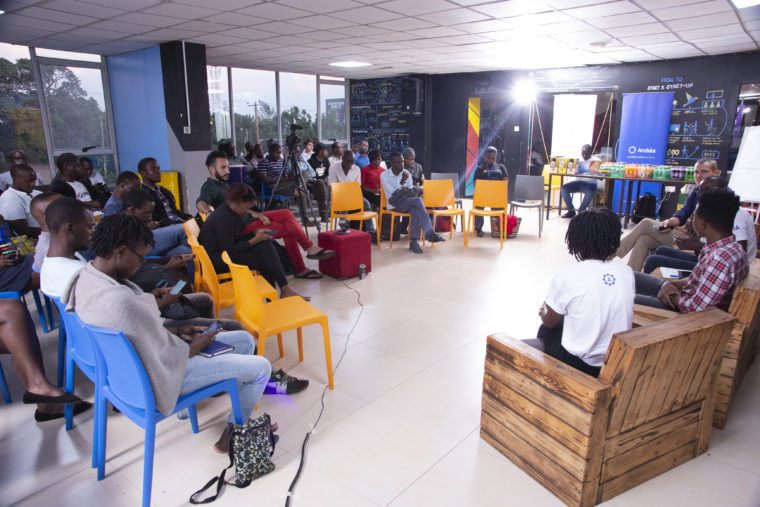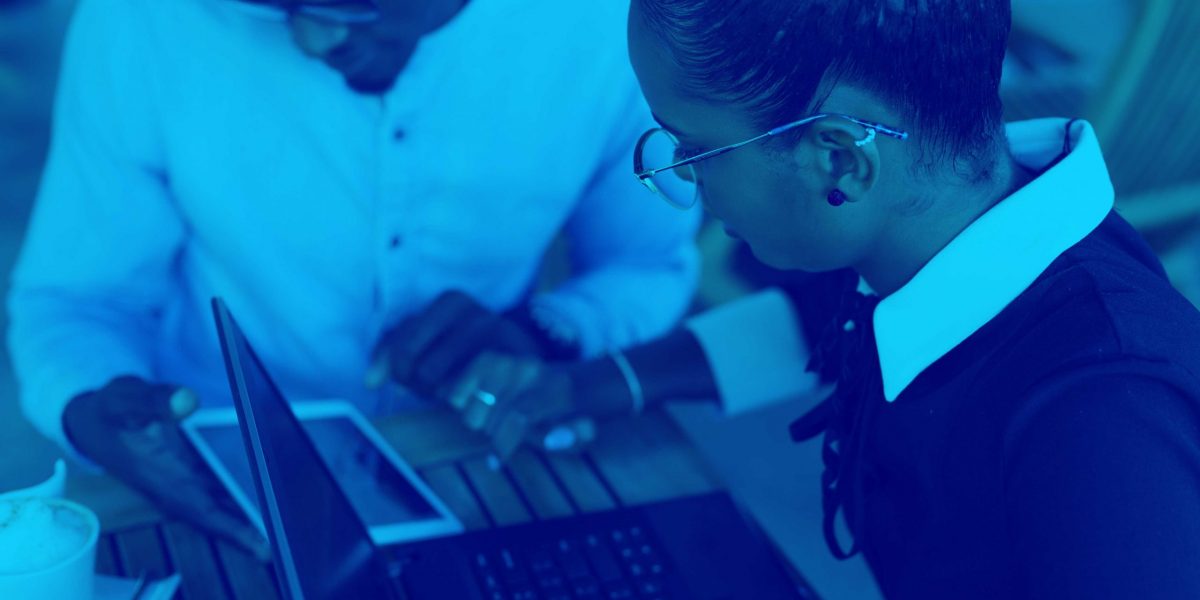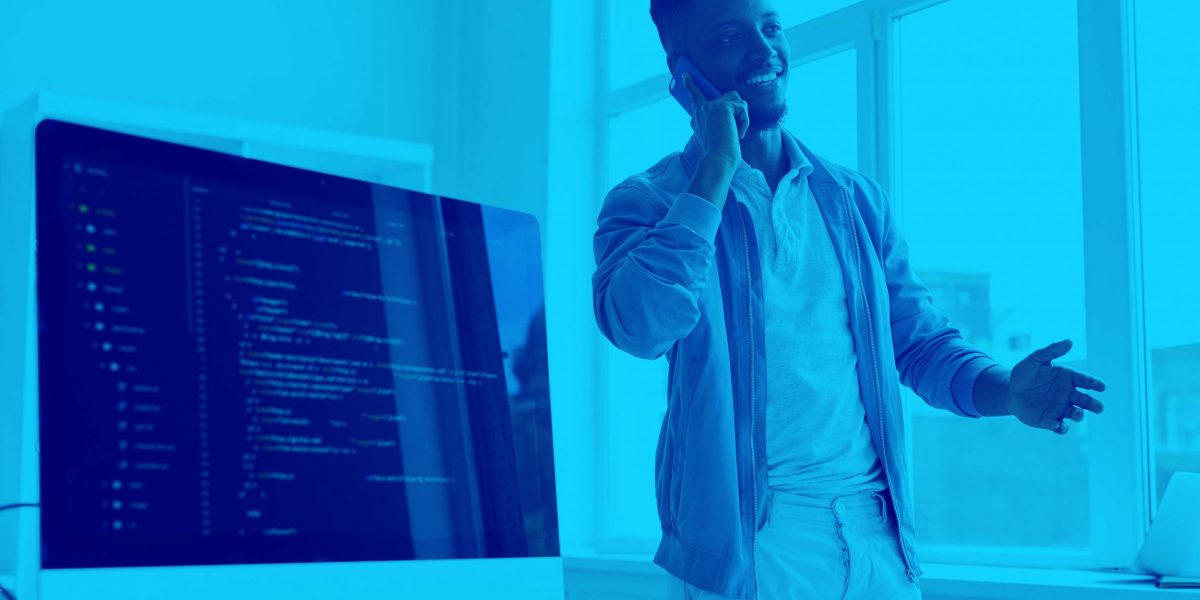Andela’s Remote Heroes event in Kampala was held on 21st November 2019 at Innovation Village in Ntinda. Guests started to arrive from 5 pm and the event began at exactly 6 pm.
The theme of the Remote Heroes was “Remote Work: A Competitive Advantage in a Distributed World” and the panelists included Kirk Agbeyengah, the CTO of SafeBoda, Reinier van Scherpenzeel, the COO of Tunga, a network marketplace which provides paid software tasks from international companies to African developers, Donna Mwiine, a Senior Software Engineer at Andela Uganda, and Jimmy Sun, VP of Engineering at OpenInvest, a startup that enables people to invest according to their values. The Remote Heroes panel was moderated by Joshua Okello, a Senior Partner Engineering Manager at Andela.
Remote Heroes Panel Session


The panel session began by each panelist defining what ‘remote-first’ meant to them and why they chose to do remote work. Jimmy Sun joined remotely from the US at exactly 6:30 pm EAT and was introduced to the audience and asked to talk about Open Invest, his role at OpenInvest and how they’re fostering remote work. The following questions sum up what proved to be a very engaging panel session:
Twitter thread with some specific questions and answers from the panelists
Qn: Why are companies starting to embrace the remote culture?
Kirk: Based on research, people are less productive when they are forced to commute to work, and sometimes being in the same space limits creativity
Reinier: I spent an hour in traffic to Ntinda from Bugolobi and sometimes I find myself Slacking someone that is seated next to me. Some jobs do not require you to be together to get work done on the same thing. But it is also about finding the right person for the right job. Why should software engineers from Africa be limited by access when they can deliver the same quality of work remotely?
Qn: Does this mean that the talent in Kampala is limiting the companies?
Donna: I have been working with a team in the US for quite a while now, and this has given me a lot of exposure. I did all this from the comfort of Kampala without having to leave the country.
Qn: How are you (SafeBoda) managing the team in Barcelona from Kampala?
Kirk: We are all aligned as a team and we know that we have timelines and these contribute to the success of the company. We also measure performance through the same system as the remote teams. We do not clock in or check on the hours of work done. This often makes the team appreciate the work they do and give their best because they see that they are valued.
Qn: How do you build trust and rapport with a remote team?
Donna: When I first joined the partner team, I scheduled 20-minute calls with each member of the team to introduce myself and to establish a rapport with them. I also ensure that before we dive into work, we check in on how each person is doing. Having a relationship with the team helps with cohesiveness.


Qn: How do you ensure productivity while on a remote team?
Donna: I often communicate proactively. If I am stuck, I seek help immediately I notice that I am unable to solve this on my own. Having good tools to use that makes communication seamless helps as well.
Qn: How do you help your teammates in a different timezone, especially if they are stuck?
Kirk: We have someone in the U.S and we ensure that when we hire, we have at least 2 people who can do the same job so that if the other person is asleep, someone else can help in another time zone. Sometimes they change their working time to adjust to the rest of the team.
Qn: How do you manage work-life balance in remote work and time difference zones?
Reiner: It is a two-sided coin. When I have to do something with my family, I can do it, but it also means that I may have to take a call with a client after the kids have gone to bed.


Donna: I am yet to completely crack the work-life balance code. It was a challenge in the beginning. I worked from 5pm – 2am, which meant that I did not hang out with my friends for the first 6 months. But I slowly started managing my schedule better. I learnt how to compensate for time spent on personal time. I have gained the trust of my partner and they know that I am available for work when I am needed. This takes discipline too. You have to choose me-time and manage expectations as well.
Qn: How do you replicate team culture in a remote team?
Jim: It is very difficult to do this, but we try to get the team to understand each other and have real conversations. We often try to get at least 80% of the team to meet in person at least once a year, but you cannot replicate in-person relationships.
Stephen Magero (Andela): At Andela, we build the relationship by having our engineers visit their teammates so that they can build rapport.
Kirk: At Safeboda, we have engineers from Barcelona where they do not understand the business and Kampala. We bring them to Uganda so that they can experience the service. Explaining why something won’t work because of OTT is very difficult until they have experienced it.
Parting shots:
Jim: Companies like Andela have given companies like ours access to great talent who are remote and are managing their growth well.


Reinier: When you are a remote worker, you have to really deliver and communicate. When you love your job, it is not that difficult but you have to manage yourself well.
Kirk: For some companies, it is not easy to manage remote workers. Sometimes it is difficult to provide benefits for remote employees because you need to register in their country. It requires a lot of discipline to manage work-life balance while doing remote work.
Donna: Remote work, has its challenges and you have to be proactive. You have to communicate, get out of your comfort zone and make yourself known to the team.
There was a brief Q&A session after which the panel discussion was closed. Closing remarks were delivered by Gloria Kemigisha, who represented the Andela’s country director’s office, followed by a cocktail and networking.




